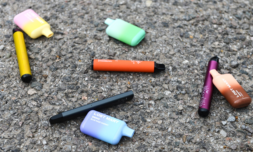Why are disposable vapes being targeted?
Single-use vapes are made of plastic, lithium-ion batteries, and electronic components – none of which are easily recyclable.
Environmental reports highlight how the improper disposal of single-use vapes is contributing to the growing issue of e-waste, which is the fastest-growing waste stream globally.
In 2022, over 62 million metric tons of e-waste were generated worldwide, and disposable vapes are part of this rising tide. To put this into perspective, a whopping 5 million vapes are thrown away in the UK every single week.
The lithium batteries in these devices, when not properly recycled, end up littering streets, parks, beaches, or landfill and leak toxic chemicals into the soil and waterways, threatening wildlife and ecosystems.
Not to mention, the outer plastic components of vapes will take hundreds of years to break down – likely into micro and nanoplastics – adding to the already out of control global pollution crisis.
Given these environmental costs and the challenges of safely disposing of their toxic components, banning disposable vapes stands to reduce e-waste, lessen pollution, and encourage the use of more sustainable alternatives like refillable vape devices.
Protecting future generations
Marketed with enticing flavours like cotton candy, bubble gum, and fruity blends, disposable vapes have been designed to appeal to young crowds.
Despite laws restricting the sale of vapes to minors, the ease of access and the product’s sleek, discreet design make them appealing and hard to regulate.
Youth vaping has skyrocketed not just in the UK, but across the pond too. In fact, the CDC has reported that 43 percent of high school students admitting to using e-cigarettes in the US.
This is troubling not just because of nicotine’s addictive qualities, but because of the long-term health risks of vaping are still unknown.
Despite being marketed as a healthier alternative to cigarettes, vapes also contain harmful chemicals, such as formaldehyde and acrolein, that can damage DNA and lung tissue.
The widespread use of vapes, combined with a lack of information about their impact on human health in the long term, paints a worrying picture for global healthcare systems of the future.
A new black market?
All things considered, banning a popular product doesn’t mean demand vanishes overnight.
Instead, it often drives the creation of an illicit market where people seek out the product through unregulated channels. In the case of disposable vapes, those addicted to nicotine or young people drawn to the sleek and flavorful designs may turn to illegal sellers.
An underground market for disposable vapes – fuelled by no ban on importing them – could lead to even greater risks.
Law enforcement would face the challenge of policing an underground trade, while public health risks could worsen with the circulation of unregulated products.
Additionally, banning disposable vapes without offering accessible alternatives for smokers looking to quit could inadvertently push them toward more harmful products, such as traditional cigarettes.
The UK’s incoming ban will help address environmental and health concerns especially amongst young people, but without a total ban on disposable vape imports, it’s likely we won’t see them disappear completely.





















